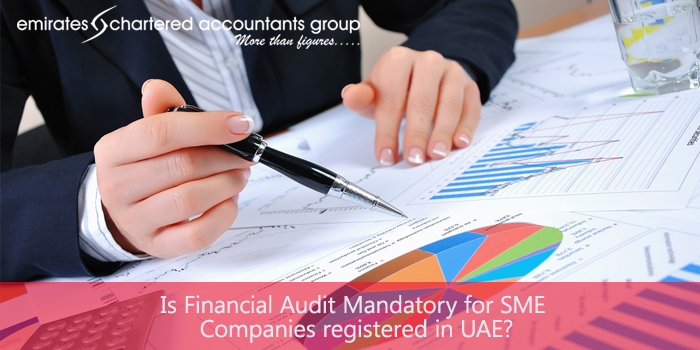
- Dec 19,2018
- All | Audit / IFRS
Is Financial Audit Mandatory for SME companies registered in UAE?
Is financial audit mandatory or not in the UAE? Should the books of accounts be audited every year or not? Whether financial reports are to be submitted to any authority or not? These are the questions that comes into the mind of most of the owners of the “Small and Medium” business in the UAE. As perthe new UAE Commercial Companies Law, Federal Law No. 2 of 2015, Article 27, Chapter 2, every company shall appoint auditors for auditing their books of accounts by a licensed auditor registered under Ministry of Economy in the UAE. But many companies do not follow this requirement. In general, companies belonging toSME category get their books of accounts audited in the following circumstances.
- Legal Requirements.
- Free Zone companies: Some of the Free Zones Authorities made it mandatory to submit the audited financial statements to the authority for renewing the trade licenses of the companies registered under them. Such free zones include; Dubai Airport Free Zone (DAFZA), Dubai World Central (DWC), Jebel Ali Free Zone (JAFZA),Dubai International Financial Center (DIFC),Dubai Silicon Oasis (DSO), Creative City – Fujairah etc.
- Branch of Foreign Companies: It is mandatory for foreign companies to submit the audited financial statements of the branch of foreign companies registered in UAE in every year.
- Liquidation of the Company : Audited financial statements of Companies under liquidation is one of the most important documents for a liquidator to prepare the liquidator’s Report.
- Other Government Authorities such as Municipality, various Ministerial Departments, Insurance Authorities, etc. also demand the companies to submit their audited financial statements as and when it is required for the authorities.
- For Management purpose.
- To understand the financial position, to evaluate the performance of the entity, to assess the progress of the business, also to get guidance from professional financial experts, some of the SME companies get their books of accounts audited. In the SME sector; the small companies normally cannot afford the service of full time CFO's or experienced management accountants under their payroll to get professional guidance in decision making.
- Sometimes, the small companies employ only a book keeper to update their day to day activities. They expect the auditor to finalize the books of accounts and provide the necessary inputs for management decision making on financial matters.Such business owners even take advice from the external auditor as to whether it is feasible to withdraw part of the profit or should it be retained in the business.
- The owners even seek advice on the net worth of the business to know if selling part of the shares to prospective owners (partners or shareholders) at a premium is a prudent proposition. At the same time, majority of the SME companies, managed properly are getting their books audited in every year.
- Third Party Requirements.
- Lenders such as bank sand/or other non- banking financial institutions insist companies to get their books of accounts audited by an audit firm which are listed by them as approved auditors.
- Suppliers or other dealers/institutions also ask the SME companies to submit their audited financial statements to ensure the credentials as well as financial credit-worthiness of the companies to deal with them.
Every company registered under UAE Commercial Company law must amend their Memorandum of Association (MOA) on or before 30th June 2017 to be in line with the provisions of the new UAE Commercial Company law issued in 2015. As per the provisions of the Law, it is mandatory to get the books of accounts audited every year. Hence with effect from 1st July 2017, every company registered under the law should get their accounts audited by a registered auditor.





